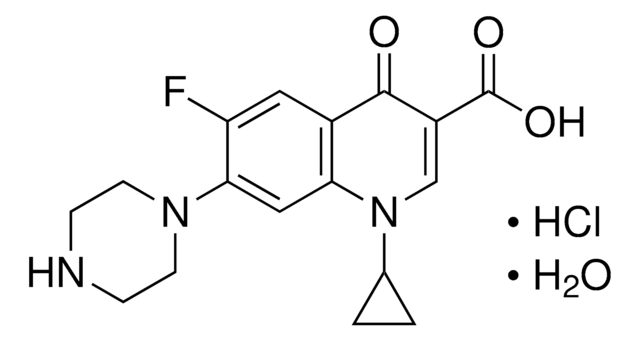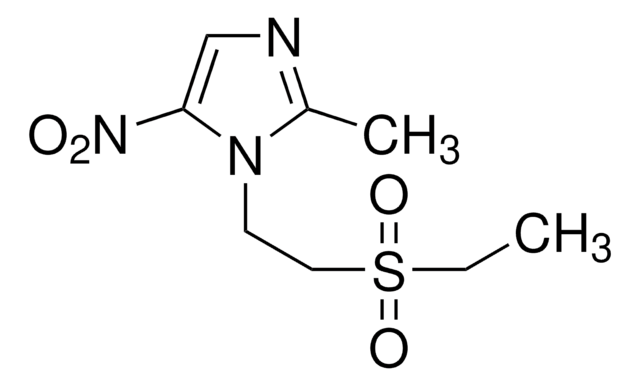1271700
USP
Fluconazole
United States Pharmacopeia (USP) Reference Standard
Sinónimos:
Fluconazole, 2-(2,4-Difluorophenyl)-1,3-bis(1H-1,2,4-triazol-1-yl)propan-2-ol
About This Item
Productos recomendados
grade
pharmaceutical primary standard
API family
fluconazole
manufacturer/tradename
USP
application(s)
pharmaceutical (small molecule)
format
neat
SMILES string
FC1=CC(F)=C(C(CN2N=CN=C2)(O)CN3N=CN=C3)C=C1
InChI
1S/C13H12F2N6O/c14-10-1-2-11(12(15)3-10)13(22,4-20-8-16-6-18-20)5-21-9-17-7-19-21/h1-3,6-9,22H,4-5H2
InChI key
RFHAOTPXVQNOHP-UHFFFAOYSA-N
¿Está buscando productos similares? Visita Guía de comparación de productos
General description
Application
- Enhanced antifungal activity of fluconazole: A study optimized fluconazole-embedded transfersomal gel, demonstrating improved antifungal activity and compatibility. This research is crucial for enhancing fluconazole′s efficacy against resistant fungal strains, making it a pivotal tool in the fight against fungal infections (Cheng et al., 2024).
- Antifungal mechanisms against drug-resistant strains: Research on the antifungal activity of a trypsin inhibitor from chia seeds against fluconazole-resistant Candida species assessed its potential as a novel therapeutic approach. This study contributes valuable insights into natural compounds enhancing fluconazole′s effectiveness, crucial for developing alternative antifungal therapies (Nogueira et al., 2024).
- Advancements in fungal pathogenesis: The isolation and identification of Wickerhamiella tropicalis from blood culture using MALDI-MS highlight innovative diagnostic techniques that enhance the understanding of fungal pathogenesis. This research is essential for advancing microbial diagnostics and tailoring treatments to combat invasive fungal infections effectively (Takei et al., 2024).
Biochem/physiol Actions
Analysis Note
Other Notes
Related product
signalword
Danger
hcodes
Hazard Classifications
Acute Tox. 4 Oral - Aquatic Chronic 3 - Lact. - Repr. 1B
Storage Class
6.1C - Combustible acute toxic Cat.3 / toxic compounds or compounds which causing chronic effects
wgk_germany
WGK 3
flash_point_f
Not applicable
flash_point_c
Not applicable
Certificados de análisis (COA)
Busque Certificados de análisis (COA) introduciendo el número de lote del producto. Los números de lote se encuentran en la etiqueta del producto después de las palabras «Lot» o «Batch»
¿Ya tiene este producto?
Encuentre la documentación para los productos que ha comprado recientemente en la Biblioteca de documentos.
Los clientes también vieron
Nuestro equipo de científicos tiene experiencia en todas las áreas de investigación: Ciencias de la vida, Ciencia de los materiales, Síntesis química, Cromatografía, Analítica y muchas otras.
Póngase en contacto con el Servicio técnico











